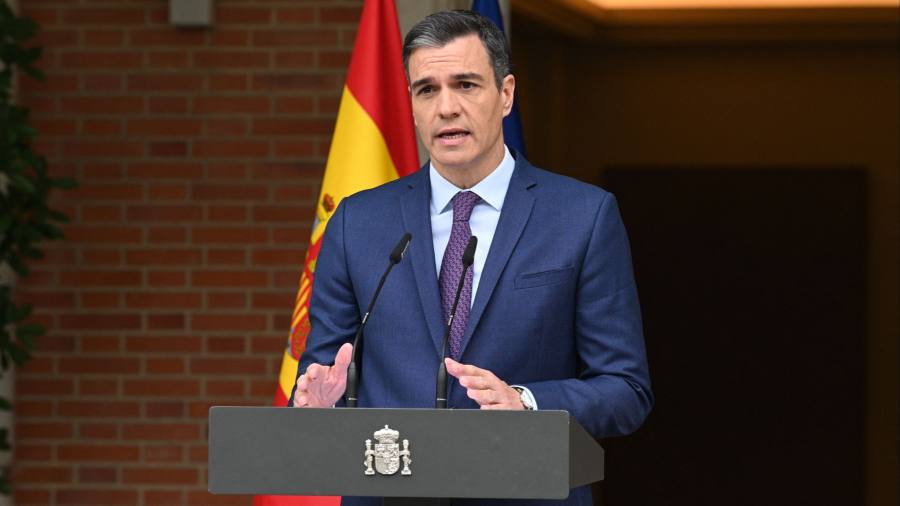Spain’s prime minister Pedro Sánchez, whose career has been marked by near death experiences and audacious gambles, has made his most daring bet yet by calling a snap general election the day after he was rebuked by voters.
Sánchez struck a tone of chastened humility as he announced a poll five months earlier than expected on July 23, saying his Socialist party’s defeat to the People’s party in local and regional elections meant it was necessary to “clarify” the will of the people.
But analysts say it is in his own interests to bring the vote forward from December, giving the canny political tactician a slim chance of consolidating votes on the left while turning the spectre of alliances with the hard-right Vox party into a problem for the conservative PP.
“It’s a smart move,” said Alicia Gil-Torres, a political consultant and professor at Valladolid university. “It’s all or nothing.”
Yet even if his chances of survival are better in a July poll, his party’s loss of swaths of territory on Sunday show the odds are stacked against him.
The first thing the snap poll achieves is to prevent months of recriminations — and even potential challenges to Sánchez’s leadership — within the Socialist party, which would leave it even more debilitated by the time of a December vote.
The potential for internecine warfare is all the greater owing to the bad blood Sánchez fostered with his previous gambits.
The prime minister has cultivated a reputation outside Spain as a debonair international statesman. But some in his own party still see him as the politician who emerged virtually unknown in 2014 to win the leadership of the Socialist party, or PSOE, only to preside over two heavy election defeats before being ousted in an internal coup two years later.
“Nobody gave a damn about him when he left the PSOE the first time,” said Gil-Torres. But after eight months in the wilderness he captured grassroots support to regain the leadership of the party in 2017 against a rival who was favoured by its former prime ministers.
The following year he became prime minister himself in extraordinary circumstances, using a no-confidence vote over corruption to convince parliament to oust a sitting government for the first time in Spain’s democratic history.
But his time in office has been marked by the fragmentation of parties on the left.
José Ignacio Torreblanca, head of the Madrid office of the European Council on Foreign Relations, said Sánchez “might think that he can capitalise on the weakness” of two leftist parties to attract votes from them and fortify his own position among progressives.
One is Podemos, a once electric political brand and his coalition partner since 2019, which performed poorly on Sunday and is tarnished by its association with a botched sexual consent law that resulted in shortened prison sentences for some sex offenders. The other party is Sumar, a group founded this year by one of Sánchez’s deputy prime ministers, Yolanda Díaz, which itself has the goal of consolidating leftwing votes. It did not field candidates in Sunday’s elections and in seven weeks may not be fully prepared for a general election either.
But Torreblanca doubted whether the ploy would work. “Voters don’t see the Socialist party as a standalone party. They see it as part of a pack,” he said — and one that also includes controversial Catalan and Basque separatists. “Sánchez has no chance of being in power on his own.”
Sumar’s Díaz, who joined Sánchez’s coalition as a member of the communist party, tweeted on Monday: “In the face of [People’s party leader Alberto Núñez] Feijóo’s dark Spain, we are out to win.”
The other potential benefit of the snap election for the prime minister is that it will spotlight the PP’s most difficult hurdle after the regional vote: the fact it achieved few absolute majorities in legislatures — except Madrid’s — meaning it will probably need coalitions or voting pacts with Vox to form governments.
A rightwing populist party, Vox is sceptical about climate change, protective of “Christian heritage” and critical of feminists and globalists. The Socialists will try to use the spectre of Vox in coalition with the PP at national level to peel centrist voters away from the PP “and to pull people out of abstaining”, said Pablo Simón, a professor of politics at Madrid’s Carlos III university.
The next few weeks will be the perfect time to do that as Vox and PP engage in semi-public negotiations over possible regional deals, a piece of conservative political theatre that the prime minister will refashion into a central part of his campaign.
But Sánchez’s shrewdness may only get him so far. “The snap election is basically geared to trying to stop what would have been a catastrophe in December,” Simón said. “But it’s very difficult for him.”
Read the full article here




